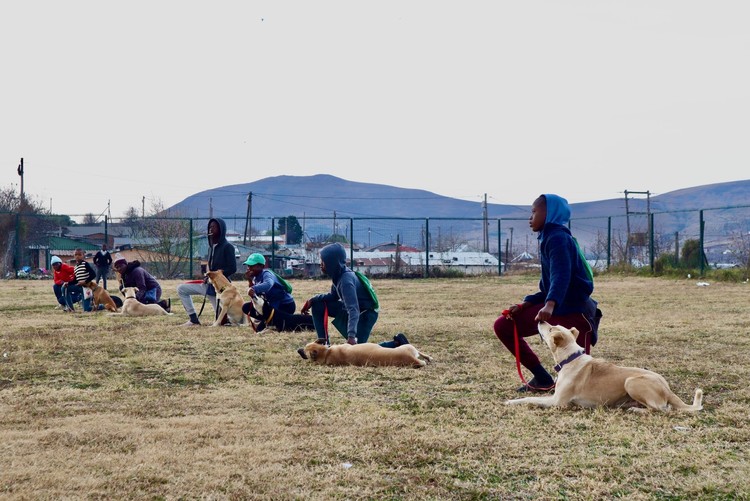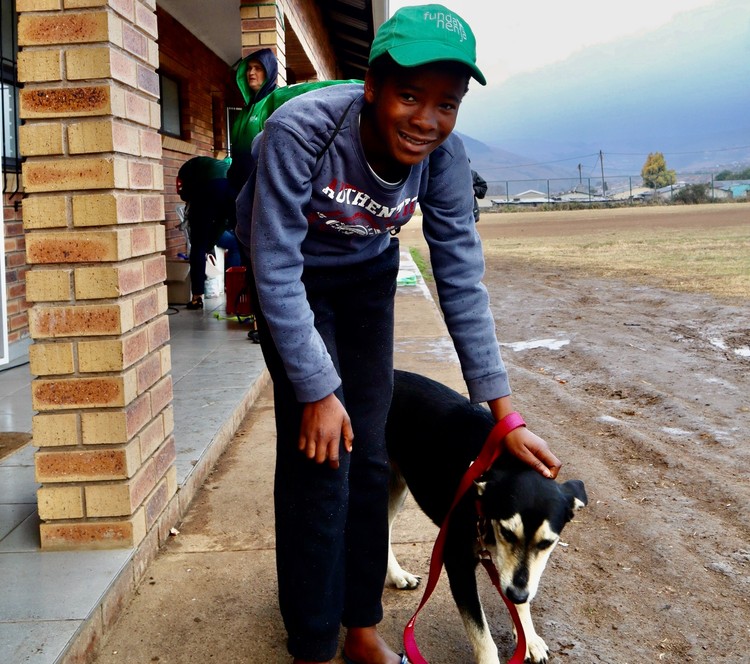
20 August 2025
Every Friday up to 50 children gather in Mpophomeni Sports Stadium to train their dogs. Photos: Joseph Bracken
Every Friday in Mpophomeni, a township in the uMngeni Municipality of KwaZulu-Natal, about 50 children gather at the local sports stadium to train their dogs. The programme is run by Funda Nenja, a non-profit organisation focused on social welfare, including animals, in the Mpophomeni area. Children are encouraged to register with their dogs and attend weekly training classes.
Adrienne Olivier, a registered dog trainer, animal behaviourist and a former teacher who now lives in Australia, founded Funda Nenja in 2009 after attending an SPCA dog show in Mpophomeni.
The programme started with basic lessons with a small number of children during the July holidays, says Lisa Button, the project administrator. Attendance started small, with only about ten students and two volunteers, but the children would bring their friends, and the numbers grew.
At the end of the holiday, the children begged for the programme to continue. Olivier decided to carry on with the classes, says Button. Attendance now regularly reaches over 50 students.
Funda Nenja offers classes every Friday, only shutting for school holidays.
Currently, Funda Nenja offers classes every Friday, only shutting for school holidays.
The lessons include basic obedience training. The children are taught about positive reinforcement and how to handle their dogs humanely. Classes are split into three groups: puppy 1, puppy 2 and adult 1, allowing for training at different levels of difficulty and ability. The trainers are all previous students of the Funda Nenja Programme. Once a month, theory classes on animal welfare are taught.
Goodluck Mvelase started as a student with his puppy in 2010 when he was eight years old. In 2014, he and his dog received a Canine Good Citizen certificate. He became a training instructor at Funda Nenja in 2016.
He says Funda Nenja has had a good impact on the community. When he sees children walking around Mpophomeni with dogs, he stops them and encourages them to register for classes.
Outside the stadium on training days, stalls sell various items, mostly donated – collars, leads, harnesses and dog food – at reduced prices for the community.
A veterinary service is also set up behind the community centre. It started with offering rabies vaccinations, but now includes deworming, tick and flea treatments, and the 5-in-1 vaccination (against distemper, adenovirus, hepatitis, parainfluenza and parvovirus). Rabies vaccinations are given for free, and a nominal fee is charged for tick and flea treatments (R5) and the 5-in-1 (R50).
Once a month, there is a sterilisation service. Steckler says, “We can do about 15 to 20 dogs in a day”.
Funda Nenja also conducts home visits to check on the wellbeing of the animals. A fencing programme helps owners keep dogs safely inside their homes.
“We found that dogs are often chained up by their owners for their pet’s safety. Building fences prevents the dogs from wandering and stops the need for chains,” said Button.
The home visits open the door for social work, says Button. Funda Nenja has a full-time social worker, so when home visits are done to check on the welfare of the dogs, the same can be done for the children who are registered in the programme.
“You know, we can see the way children are treated by the way they treat their dogs,” said Button.
Once having identified any issues in the home, Funda Nenja’s social worker, Zinhle Msimango, can help with psychosocial needs of the children and their families. She also helps families apply for ID documents and social grants and to get food support.

Azola Zondi, a 14-year-old student, has been going to training classes with her dog, Baby, for two years. Through the training process, she and her dog have been able to form a close relationship, says Zondi. “I love Baby,” she says.